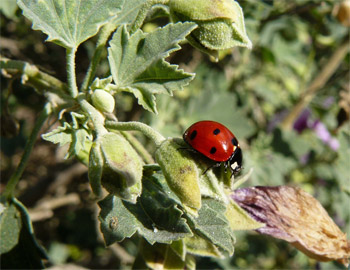Organic Gardening Pest Control Tips

Organic Gardening Pest Control Tips
All gardeners love the idea of organic gardening without having to use pesticides, but is it really possible? Well, if you employ certain complementary strategies in order to keep your crops pest- and disease-free, then organic pest control it is a very achievable goal.
If any pest problems do arise, your first recourse should be to organic practices. Don't turn to chemical-based procedures unless you've tried other options first, as they can poison the soil and produce, eventually harming the people who consume the latter.
If you suspect a pest outbreak has occurred, the first thing you need to do is to identify the pest. Not all insects should be eradicated, and most insects are actually helping, not harming your crops, or are simply harmless. You want to ensure only the real pests are being kept under control.
Chemical sprays for pests should only be resorted to when proper damage is being caused. Never indiscriminately spray, as beneficial insects can be killed, and that can cause your crops to experience even greater problems.
Everyone knows pests tend to target plants that are already unhealthy. Prevention is the best cure, so tending to the health of your plants produces the tastiest, biggest and most pest-free crops.
Maintaining a healthy and diverse community of micro-organisms and earthworms is crucial to the health of your crops. Avoid nitrogen-based chemical fertilisers, which may show quick results but will ultimately damage the health of your plants.
It is absolutely crucial to regularly add compost and manure to your garden. Compost and manure give your plants the necessary nutrition and also contain micro-organisms that can boost the ecosystem your crops are a part of.
If you're using compost and manures, try adding liquid fertilisers with a fish or seaweed base, as they can offer an additional supply of nutrients and help your plants grow faster.
Water
Everyone knows water is one of the things a plant needs most for survival. Always keep your plants well-watered to help them become strong and healthy. Note that if you are using compost, your garden will actually need less water.
Mulch helps to keep a garden moist by providing the soil with insulation and maintaining a constant temperature. Fluctuations in temperature, as happens in the summer, can stress a plant and make it more vulnerable to disease and pests.
Sunshine and air
Plants need exposure to sunshine and good ventilation to thrive. Providing your plants with adequate sunshine and ventilation also protects them from pests with an attraction to high humidity. The site you select for your plants and regular pruning sessions can also promote good air circulation, which reduces pests.
Rotate crops
Rotating your crops around the garden can improve the health of your plants and keep them pest-free. Document your planting rotation and ensure you leave a minimum gap of three years before planting the same crop in an area.
Attract predators
Crop timing
When you plant your crops matters as much as where you plant them. Crops planted off-season, from a climate that's different from yours or with pH requirements that differ from your current pH levels will find it tougher to grow up healthy. Unhealthy plants are more attractive to pests.
Diverse crops
Creating a diverse ecosystem promotes plant health, so make sure individual crops are interspersed with flowers, herbs and other plants that can attract helpful insects. Fail to do this and you are at a higher risk of suffering a pest attack that could decimate a complete crop.
Keeping your plants pest-free is really a question of keeping them in good health and reducing the risk factors for pest infestations by increasing diversity and inviting beneficial species. With careful planning, you can reduce as much as possible the use of harmful pesticides.
Author: Brie Moreau works with Flick Anticimex Pest Control. When he is not on the clock he enjoys surfing, fishing and curling up with a great book.
MORE



